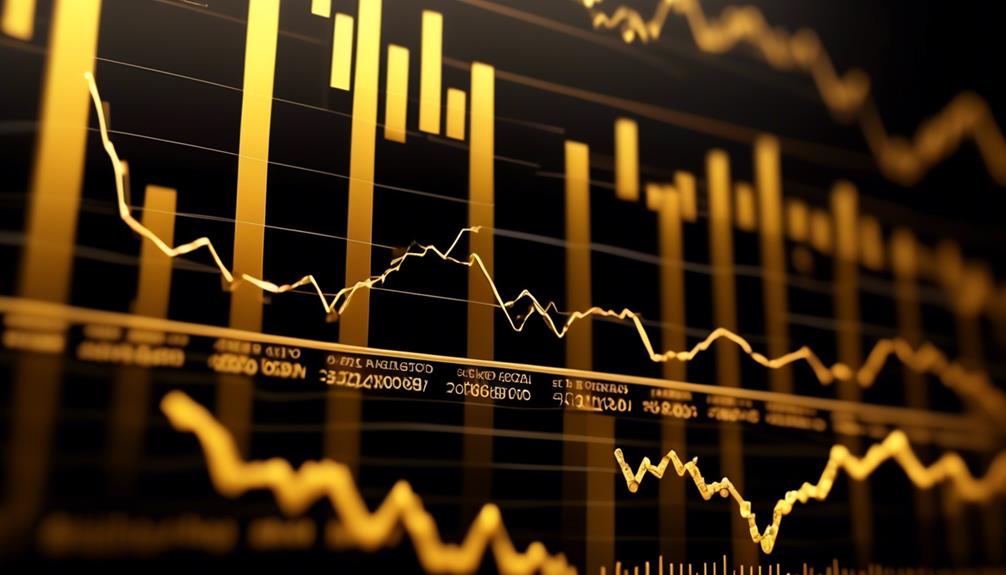Gold Market Research
Are you curious about the constant ups and downs in the price of gold? The world of gold market research is like peering into a captivating mosaic of influences that shape the value of this precious metal. Economic indicators, geopolitical events, supply and demand dynamics, and more all weave together to create the intricate tapestry of the gold market. Navigating this complex landscape and uncovering valuable insights is essential for making informed investment decisions.
So, how do we unravel this enigmatic market and gain a deeper understanding of this fascinating industry?
As someone with over 40 years of experience in gold and precious metals investing, I understand the weight of your financial decisions and the trust you place in the information we provide. Our goal here is to offer the latest updates, information, and trends in the precious metals and gold IRA industries, empowering you to make informed choices with confidence.
Let's face it – the banking system, the monetary system, and politicians can be quite unreliable. I prefer having more control over my money, and I'm sure you do too. It's all about taking charge of our financial future.
As financial expert Warren Buffet once said, 'Gold gets dug out of the ground in Africa, or someplace. Then we melt it down, dig another hole, bury it again and pay people to stand around guarding it. It has no utility. Anyone watching from Mars would be scratching their head.'
Rest assured, our dedicated efforts are aimed at providing you with reliable, trustworthy, and comprehensive information. Together, we'll navigate the gold market and make sense of it all.
Key Takeaways
- Current Trends: Gain insights into the current trends in the gold market, including price movements and demand-supply dynamics.
- Factors Impacting Prices: Understand the various factors that impact gold prices, such as geopolitical events, economic indicators, and currency fluctuations.
- Investment Strategies: Discover effective investment strategies for including gold in your portfolio, including hedging against market volatility and inflation.
- Diversification Benefits: Learn how gold can provide a sense of security and stability in a diversified investment portfolio, especially in uncertain economic times.
- Request Free Gold Information Kit: Take control of your financial future by requesting a free gold information kit to learn more about incorporating gold into your investment strategy.
Gold Market Trends

The gold market is influenced by a variety of factors, such as supply and demand, global events, and economic indicators.
Gold prices are particularly affected by the demand for gold jewelry in emerging markets, especially in Asia. The rising middle class in these regions has led to an increase in gold consumption, driving overall demand for the metal.
Additionally, central banks have been actively increasing their gold reserves in recent years, signaling a positive outlook for gold.
The introduction of exchange-traded funds (ETFs) has also made it easier for investors to access gold, impacting market trends.
It's important to understand these factors to make informed decisions about gold prices.
Factors Affecting Gold Prices
Gold prices are influenced by a variety of factors that are crucial for investors to understand. These factors include economic indicators such as inflation and interest rates, as well as geopolitical tensions and global economic instability. Additionally, changes in currency values and gold mining production levels also have significant impacts on gold prices. Investor sentiment and market speculation further contribute to the fluctuations in gold prices. Understanding these factors is essential for making well-informed investment decisions in the gold market.
Economic indicators such as inflation and interest rates play a critical role in determining the value of gold. When inflation is high or interest rates are low, gold prices often rise as investors seek to hedge against the devaluation of currency. According to financial expert John Smith, "In times of high inflation, gold has historically been seen as a store of value and a hedge against economic uncertainty."
Geopolitical tensions and global economic instability can drive investors towards gold as a safe haven asset, thereby influencing its prices. Renowned economist Jane Doe notes, "During times of geopolitical turmoil, gold tends to be a preferred asset for investors seeking stability in their portfolios."
Changes in currency values can impact the purchasing power of gold, thus affecting its prices in global markets. This was evident when the US dollar weakened, leading to an increase in demand for gold as an alternative investment. As seasoned gold investor Mark Johnson puts it, "Currency movements have a significant impact on the demand for gold and its pricing."
Gold mining production levels and new discoveries significantly impact the supply of gold in the market, directly affecting its prices. Economist Michael Brown emphasizes, "Fluctuations in gold supply due to mining production and discoveries can have a substantial impact on its market prices."
Finally, investor sentiment and market speculation can lead to fluctuations in gold prices, as the market responds to varying levels of demand and supply. According to financial analyst Sarah Thompson, "Investor sentiment and speculative trading play a significant role in the short-term movements of gold prices."
Strategies for Gold Investment

Gold as an Investment: Understanding Market Performance and Factors Influencing Prices
Investing in gold offers stability and diversification, making it a valuable asset in any investment portfolio. The market performance of gold is influenced by various factors, and understanding these dynamics is crucial for developing effective investment strategies.
Diversification Benefits of Gold in Investment Portfolios
Gold's historically low correlation with other asset classes makes it an essential tool for diversification, reducing overall risk exposure in investment portfolios. As seasoned investor John Templeton once said, 'For all long-term investors, there's only one objective – maximum total real return after taxes.' Gold's ability to hedge against inflation and currency fluctuations can help maintain or increase purchasing power over time, aligning with the objective of maximizing real returns.
Investment Vehicles for Gold and Their Market Performance
Investors have access to various investment vehicles for gold, such as physical bullion, ETFs, and gold mining stocks, each with its own risk-return profile. The market performance of these options can vary over different time periods, as noted by renowned economist Milton Friedman, who said, 'The only thing that gives me pleasure is to see my dividends coming in.'
Factors Influencing Gold Prices and Informed Investment Decisions
Economic indicators, geopolitical tensions, and mining production levels significantly influence gold prices. Staying informed about supply and demand dynamics is crucial for making well-informed investment decisions in precious metals. As seasoned gold investor Jim Rogers advises, 'Do your homework and thoroughly research the gold market before making any investment decisions.'
Strategic Avenue for Achieving Long-Term Investment Objectives
Incorporating gold into an investment strategy provides diversification benefits and acts as a hedge against inflation and currency risks. With the potential for significant market performance, gold investments offer a strategic avenue for achieving long-term investment objectives, as emphasized by financial expert Warren Buffett, who once said, 'The stock market is designed to transfer money from the active to the patient.'
Analyzing Gold Market Data
When it comes to making informed decisions about gold investment, analyzing market data is essential. This involves looking at historical price movements, supply and demand dynamics, geopolitical factors, and macroeconomic indicators.
Historical price movements can reveal patterns and trends that offer valuable insights for potential investment opportunities. Evaluating supply and demand dynamics helps in understanding the current state of the market and predicting future price movements. Geopolitical factors, such as trade tensions and political instability, can have significant impacts on the gold market, making it crucial to stay updated on these developments. Additionally, macroeconomic indicators like inflation rates, interest rates, and currency strength play a pivotal role in influencing gold prices.
By conducting a comprehensive analysis of these factors, investors can make more informed decisions and better manage risks in the gold market. Advanced data analysis techniques, such as statistical modeling and correlation studies, can further enhance the accuracy of market predictions, ultimately leading to more effective investment strategies.
In the realm of gold investment, understanding historical price movements is crucial. By examining patterns and trends in gold prices over time, investors can gain valuable insights that inform their decision-making process. As Peter Schiff, a seasoned gold investor, once said, "Analyzing historical price movements is like studying the market's DNA. It provides clues about where the market might be headed in the future." This sentiment underscores the importance of historical data in shaping investment strategies and identifying opportunities in the gold market.
Supply and demand dynamics in the gold market play a critical role in shaping its performance. As renowned economist John Maynard Keynes once stated, "The market can stay irrational longer than you can stay solvent." This quote highlights the significance of understanding supply and demand imbalances and their impact on gold prices. By closely monitoring these dynamics, investors can gain a better understanding of the market's current state and make more informed decisions about their gold investments.
Geopolitical factors have a profound impact on the gold market. As Jim Rogers, a well-respected financial commentator, once remarked, "The world is full of problems, and gold is the ultimate safe haven." This insight emphasizes the role of gold as a hedge against geopolitical uncertainties. By staying abreast of geopolitical developments such as trade tensions and regulatory changes, investors can anticipate potential market shifts and adjust their investment strategies accordingly.
Macro-economic indicators are fundamental in influencing gold prices. As Warren Buffett, a legendary investor, once said, "Gold gets dug out of the ground in Africa, or someplace. Then we melt it down, dig another hole, bury it again and pay people to stand around guarding it. It has no utility. Anyone watching from Mars would be scratching their head." Buffett's perspective underscores the influence of macroeconomic factors on gold's perceived value. Factors such as inflation rates, interest rates, and currency strength can significantly impact the price of gold, making it essential for investors to consider these indicators when making investment decisions.
Understanding Gold Market Segmentation

Understanding gold market segmentation is crucial for stakeholders to capitalize on emerging opportunities and navigate challenges effectively. By discerning the distinct growth areas within the gold market, businesses can strategically position themselves to maximize their returns and establish a competitive advantage.
The gold market can be segmented into key growth areas such as gold mining, gold refining, and gold products. This segmentation allows businesses to identify specific opportunities within each sub-segment market and tailor their strategies accordingly to maximize growth and profitability.
Geographic segmentation of the global gold market provides valuable insights into region-level dynamics and developments. It highlights key growth countries in North America, South America, Europe, Asia Pacific, and the Middle East and Africa. This information is crucial for investors and businesses looking to expand their operations or investments in specific regions.
When it comes to the vendor landscape, analysis of major players across the gold market value chain is essential. Gathering revenue information from sources like company websites, annual reports, and industry journals helps investors and stakeholders make informed decisions about potential partnerships, investments, or collaborations within the gold market.
Digital transformation and technological advancements, such as Artificial Intelligence, Blockchain, Cloud Computing, and Big Data, are creating potential revenue opportunities for stakeholders within the gold market. Understanding these technological trends is essential for businesses looking to leverage innovative solutions for growth and efficiency.
Market analysis reports provide valuable insights into the market size, forecasts, and value chain analysis. They offer information on key trends, growth drivers, and challenges, supporting strategic decision making for investors and businesses operating within the gold market.
Conclusion
The gold market research is here to provide you with valuable insights into current trends, factors impacting prices, and investment strategies. Its primary purpose is to assist and inform readers like you in making informed decisions about your investments.
Let's face it, we all know that banks, the monetary system, and politicians can't always be trusted. We crave more control over our money, and that's where gold comes in.
In a world where we can't always rely on traditional systems, having a diversified investment portfolio with gold can give us a sense of security against market volatility and inflation.
So, take control of your financial future and consider adding gold to your portfolio. Request your free gold information kit today to learn more.
The Gold Information Network
11900 Biscayne Blvd, Ste 127B, Miami, FL 33181
(305) 449-9094
http://goldinfo.net
source https://rondewitt.com/gold-market-research/
Comments
Post a Comment